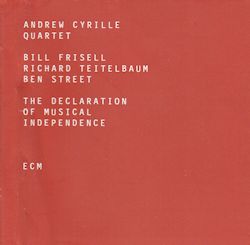
BUY NOW AmazonUK AmazonUS |
ANDREW CYRILLE QUARTET The Declaration Of Musical Independence
|
Coltrane Time
Kaddish
Sanctuary
Say
Dazzling (Perchordially Yours)
Herky Jerky
Begin
Manfred
Song For Andrew No. 1
Andrew Cyrille - Drums, percussion
Bill Frisell - Guitar
Richard Teitelbaum - Synthesizer, Piano
Ben Street - Double bass
Two members of this quartet, Andrew Cyrille and Richard Teitelbaum, share the year of their birth (1939), the fact that they are both New Yorkers, experience as jazz educators and a long-time commitment to the free jazz movement. To be accurate, drummer and percussionist Cyrille has, during his career, sampled the joys of more conventional jazz settings, but his ten years with pianist Cecil Taylor, another important figure in the evolution of free jazz, were significant ones. Teitelbaum was a pioneer of the use of synthesizers, such as the modular Moog, and is also known for his role in establishing Musica Elettronica Viva in Rome 1966, to promote electronic music. One writer in describing his approach went so far as to refer to “the arcane experiments of Richard Teitelbaum”. The other members of the quartet are the highly esteemed Bill Frisell on guitar and bassist Ben Street, an in-demand sideman who also has form in the area of avant-garde and free jazz. In the accompanying booklet, Street offers a rationale for the album under review. With only one exception, the music was written by individual group members or, in the case of Sanctuary and Manfred as a collective effort by all four.
I must confess that the disc is rather too esoteric for my taste, at least in parts. The standout is Kaddish, a Bill Frisell melody. The title refers to a Jewish liturgical prayer, a form of which is used on the anniversary of a death and during the subsequent period of mourning. The track itself is, dare I say it, haunting, and provides a showcase for the sublime Mr Frisell. Coltrane Time was written but not recorded by John Coltrane himself. Cyrille himself came across it through Rashied Ali who had played with Coltrane for a short while, and who later with Cyrille and Milford Graves formed the Dialogue Of The Drums trio. Cyrille then adopted it as an occasional solo item. The piece begins with rhythmic drumming, almost military in its precision (snare drum?) but opens out so that synthesizer, guitar and bass can also take their turn. Creative and unusual. Ben Street's Say is mesmeric and brief with a thoughtful contribution from Frisell. The guitarist's Song For Andrew No. 1 proves to be an absorbing listen, with Frisell again conspicuous. As for the rest of the album, there are individual moments, of course, to appreciate. For instance, the sheer diversity of sounds that Cyrille can conjure up from his kit on Sanctuary (and elsewhere), the vibrant bass of Ben Street on Dazzling or the rippling, cascading chords on Herky Jerky. For all that, I found myself disappointed at the end result. Free improvisation can make for an interesting ride but leave the listener uncertain as to the destination. About half the tracks had that effect on me.
There's an audience, of course, for avant-garde or minimalist music in a jazz context. I would encourage such to give the disc a try. I suspect it may take a number of plays to fully grasp its subtleties. Those looking for melody will, on the whole, feel short-changed. A shame when Bill Frisell, who is masterly in that respect, is around.
James Poore